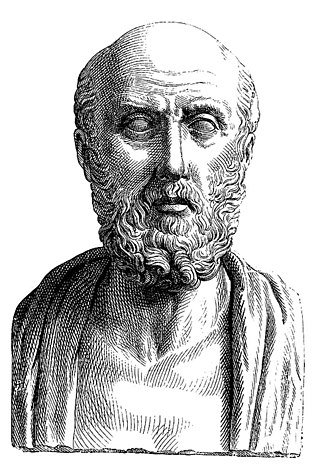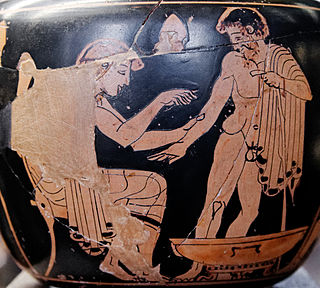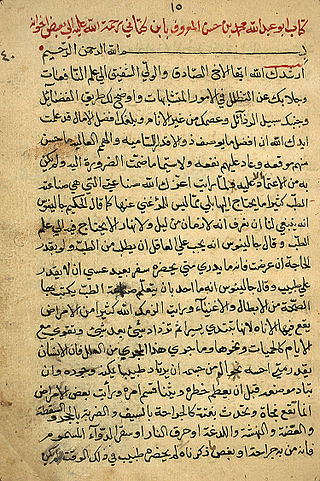See also
| International | |
|---|---|
| National | |
| | This biography related to medicine in Iran is a stub. You can help Wikipedia by expanding it. |
Abu al-Hasan Ahmad ibn Muhammad al-Tabari, born in Amol, was a 10th-century Persian [1] physician from Tabaristan. He was the physician of Rukn al-Dawla, a Buyid ruler.
He was author of a compendium of medicine Kitab al-mu'alaja al-buqratiya (Hippocratic treatments), in ten books. It is extant only in Arabic language. Tabari has written valuable articles on different medical sciences; however, he is especially famous for authoring the al-Mu'alajat al-Buqratiya (Hippocratic Treatments) - an important medical encyclopedia. Several of Al-Tabari's succeeding scholars and physician have referred to the al-Mu'alajat al-Buqratiya in their medical articles. The aim of this study is further introduction of this great physician and assessment of his theories and key works.
{{cite journal}}: Cite journal requires |journal= (help)CS1 maint: multiple names: authors list (link)
Hippocrates of Kos, also known as Hippocrates II, was a Greek physician of the classical period who is considered one of the most outstanding figures in the history of medicine. He is traditionally referred to as the "Father of Medicine" in recognition of his lasting contributions to the field, such as the use of prognosis and clinical observation, the systematic categorization of diseases, or the formulation of humoral theory. The Hippocratic school of medicine revolutionized ancient Greek medicine, establishing it as a discipline distinct from other fields with which it had traditionally been associated, thus establishing medicine as a profession.

The Hippocratic Oath is an oath of ethics historically taken by physicians. It is one of the most widely known of Greek medical texts. In its original form, it requires a new physician to swear, by a number of healing gods, to uphold specific ethical standards. The oath is the earliest expression of medical ethics in the Western world, establishing several principles of medical ethics which remain of paramount significance today. These include the principles of medical confidentiality and non-maleficence. As the seminal articulation of certain principles that continue to guide and inform medical practice, the ancient text is of more than historic and symbolic value. It is enshrined in the legal statutes of various jurisdictions, such that violations of the oath may carry criminal or other liability beyond the oath's symbolic nature.

Abū Bakr al-Rāzī, c. 864 or 865–925 or 935 CE, often known as (al-)Razi or by his Latin name Rhazes, also rendered Rhasis, was a Persian physician, philosopher and alchemist who lived during the Islamic Golden Age. He is widely regarded as one of the most important figures in the history of medicine, and also wrote on logic, astronomy and grammar. He is also known for his criticism of religion, especially with regard to the concepts of prophethood and revelation. However, the religio-philosophical aspects of his thought, which also included a belief in five "eternal principles", are fragmentary and only reported by authors who were often hostile to him.
Muhammad ibn Jarir ibn Yazid, commonly known by his nisbaal-Tabari, was a Muslim historian and scholar from Amol, Tabaristan. Among the most prominent figures of the Islamic Golden Age, al-Tabari is known for his historical works and expertise in Qur'anic exegesis, but he has also been described as "an impressively prolific polymath". He wrote works on a diverse range of subjects, including world history, poetry, lexicography, grammar, ethics, mathematics, and medicine.
The name Tabari or al-Tabari means simply "from Tabaristan", an Iranian province corresponding to parts of modern Iranian province of Mazandaran.

Hasan ibn Ali ibn Abi Talib was a prominent early Islamic Alid political and religious leader. The eldest son of Ali and Fatima and a grandson of the Islamic prophet Muhammad, Hasan briefly ruled as caliph from January 661 until August 661. He is considered as the second Imam in Shia Islam, succeeding Ali and preceding his brother Husayn. As a grandson of the prophet, he is part of the ahl al-bayt and the ahl al-kisa, and also participated in the event of mubahala.
Ali ibn Sahl Rabban al-Tabari, was a Persian Muslim scholar, physician and psychologist, who produced one of the first Islamic encyclopedia of medicine titled Firdaws al-Hikmah. Ali ibn Sahl spoke Syriac and Greek, the two sources of the medical tradition of Antiquity which had been lost by medieval Europe, and transcribed in meticulous calligraphy. His most famous student was the physician and alchemist Abu Bakr al-Razi. Al-Tabari wrote the first encyclopedic work on medicine. He lived for over 70 years and interacted with important figures of the time, such as Muslim caliphs, governors, and eminent scholars. Because of his family's religious history, as well as his religious work, al-Tabarī was one of the most controversial scholars. He first discovered that pulmonary tuberculosis is contagious.

The Hippocratic Corpus, or Hippocratic Collection, is a collection of around 60 early Ancient Greek medical works strongly associated with the physician Hippocrates and his teachings. The Hippocratic Corpus covers many diverse aspects of medicine, from Hippocrates' medical theories to what he devised to be ethical means of medical practice, to addressing various illnesses. Even though it is considered a singular corpus that represents Hippocratic medicine, they vary in content, age, style, methods, and views practiced; therefore, authorship is largely unknown. Hippocrates began Western society's development of medicine, through a delicate blending of the art of healing and scientific observations. What Hippocrates was sharing from within his collection of works was not only how to identify symptoms of disease and proper diagnostic practices, but more essentially, he was alluding to his personable form of art, "The art of true living and the art of fine medicine combined." The Hippocratic Corpus became the foundation upon which Western medical practice was built.

The treatise On Ancient Medicine is perhaps the most intriguing and compelling work of the Hippocratic Corpus. The Corpus itself is a collection of about sixty writings covering all areas of medical thought and practice. Traditionally associated with Hippocrates, the father of Western medicine, philological evidence now suggests that it was written over a period of several centuries and stylistically seems to indicate that it was the product of many authors dating from about 450–400 B.C.

'Ali ibn al-'Abbas al-Majusi, also known as Masoudi, or Latinized as Haly Abbas, was a Persian physician and psychologist from the Islamic Golden Age, most famous for the Kitab al-Maliki or Complete Book of the Medical Art, his textbook on medicine and psychology.

Abu Mansur al-Hasan ibn Nuh al-Qumri was a Persian court physician to the Samanid Prince al-Mansur, and was based in the city of Bukhara. Qumri is theorized to be Avicenna’s teacher.

In the history of medicine, "Islamic medicine" is the science of medicine developed in the Middle East, and usually written in Arabic, the lingua franca of Islamic civilization.

Ancient Greek medicine was a compilation of theories and practices that were constantly expanding through new ideologies and trials. The Greek term for medicine was iatrikē. Many components were considered in ancient Greek medicine, intertwining the spiritual with the physical. Specifically, the ancient Greeks believed health was affected by the humors, geographic location, social class, diet, trauma, beliefs, and mindset. Early on the ancient Greeks believed that illnesses were "divine punishments" and that healing was a "gift from the Gods". As trials continued wherein theories were tested against symptoms and results, the pure spiritual beliefs regarding "punishments" and "gifts" were replaced with a foundation based in the physical, i.e., cause and effect.

Diyāʾ al-Dīn Abū Muḥammad ʿAbd Allāh ibn Aḥmad al-Mālaqī, commonly known as Ibn al-Bayṭār was an Andalusian Arab physician, botanist, pharmacist and scientist. His main contribution was to systematically record the additions made by Islamic physicians in the Middle Ages, which added between 300 and 400 types of medicine to the one thousand previously known since antiquity. He was a student of Abu al-Abbas al-Nabati.

A bimaristan or simply maristan,, known in Arabic also as dar al-shifa is a hospital in the historic Islamic world. It origins can be traced back to Sassanian Empire prior to the Muslim conquest of Persia.

Abu Abd Allah Muhammad ibn al-Husayn Ibn al-Kattani al-Madhiji (951–1029), sometimes nicknamed "al-Mutatabbib", was a well-known Arab scholar, philosopher, physician, astrologer, man of letters, and poet.
In Islam, prophetic medicine is the advice given by the Islamic prophet Muhammad with regards to sickness, treatment and hygiene as found in the hadith. It is usually practiced primarily by non-physician scholars who collect and explicate these traditions. Prophetic medicine is distinct from Islamic medicine, which is a broader category encompassing a variety of medical practices rooted in Greek natural philosophy. In practice, prophetic medical traditions encourage not only following Muhammad's teachings, but to search for cures to various ailments as well. The literature of prophetic medicine thus occupies a symbolic role in the elucidation of Islamic identity as constituted by a particular set of relationships to science, medicine, technology and nature. There has historically been a tension in the understanding of the medical narratives of the hadith. Some are unsure whether to treat them the same as Muhammad's religious pronouncements, or as time-sensitive, culturally situated, and thus not representative of a set of eternal medical truths. This body of knowledge was fully articulated only in the 14th century, at which point it was concerned with reconciling Sunnah (traditions) with the foundations of the Galenic humoral theory that was prevalent at the time in the medical institutions of the Islamicate world. It is nonetheless a tradition with continued modern relevance to this day.
Al-Hārith ibn Kalada was an Arab physician and a companion of the Islamic prophet Muhammad. He is said to have traveled to Gundeshapur in search of medical knowledge before the advent of Islam.